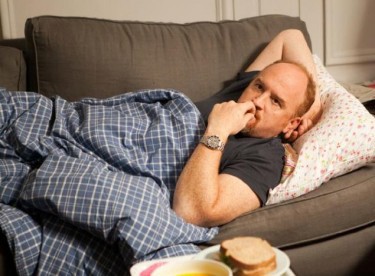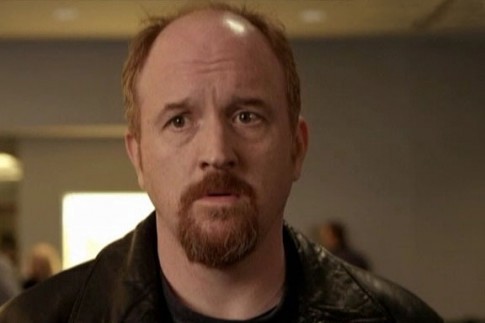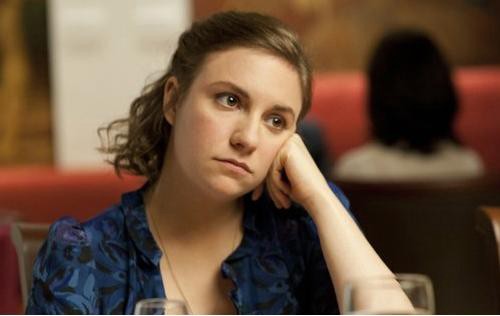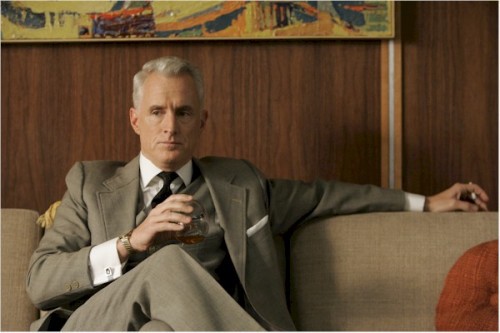3 Tired TV Tropes & 3 Shows That Toppled Them

This #NoBollocks content was produced in partnership with Newcastle Brown Ale. If you enjoy this article, won’t you be a love and watch a TV commercial on the Internet? Go on, it’s right there on the right.
After two or three decades of exposure, watching TV can feel a little bit like going home to visit your family. At first it’s comforting to see so many old familiar faces. But… why don’t these people ever change? Why are they so rigid and repetitive and tedious? And what makes them think they’re remotely interesting, or even marginally entertaining?
On the internets, we refer to these humans as either “stereotypes” or “the detritus of the past,” depending on the situation. Having witnessed these stock characters over and over again as children, TV showrunners grow up and populate their own TV shows with them. This way, they hardly even have to wake up to write that scene where the Sensible Mom With The Hot Body confronts the Rebellious Teenager about her skimpy outfit. Although writers like to call this “being in the zone,” it’s actually more like simple regurgitation. You know how mother birds eat worms, then vomit them into their babies’ mouths? It’s like that, only it pays a lot more.
That said, in the past decade, lots of smart, talented writers who might’ve become novelists during another era have decided that getting paid obscene amounts of money is much nicer than typing away in insolvent obscurity while slowly drinking themselves to death. As a result, some of these recurrent familiar faces on our TV screens are getting a much-needed makeover. Let’s meet a few of them, shall we?
THE HAPLESS DAD

On the vast majority of family shows, “Dad” isn’t a person so much as a shapeless halfwit, fumbling confusedly with modern appliances, sputtering hopelessly in the face of tiny marital challenges, and just generally underwhelming friends, family and foes at home and at work. Strangely, though, this subhuman of limited charms, very little wisdom, and almost no capacity for grasping complex emotions is, nine times out of ten, remarkably smug about himself and his abilities. Name almost any TV dad on any TV show in TV history, and they’re all pretty much the same with minor variations. They’re simple, self-satisfied beasts who’ll go to great lengths to avoid hassles. As accurate a snapshot of the domesticated male as this might be, there are only so many jokes you can squeeze out of a human being with the charisma of an overstuffed armchair.
Yes, it’s true that, as Hanna Rosin recently pointed out at Slate, the Hapless Dad has evolved to a state where he occasionally enjoys parenting (No way!) and isn’t always terrible at it (Amazing!). Even so, many of the standard complacent-jerk dimensions are still in place, even on great sitcoms like “Modern Family” and “Up All Night.” Even The Evolved Hapless Dad makes clueless remarks, screws up with clock-like precision, and feels proud of himself in spite of it all.
But, given how inept he is, why doesn’t Hapless Dad hate himself more? Why isn’t he anxious or depressed or paralyzed by low self-esteem, doomed to spend the balance of his days making time with those buxom Nord beauties from Skyrim? And how long would the Sensible Mom With The Hot Body reasonably stick around before her friends urged her to dump that self-satisfied schmuck on the couch?
Thankfully, Louis CK came along and endowed the Hapless Dad with the self-loathing that he rightfully deserves. On FX’s “Louie,” our hero embodies all of the fumbling and emotionally stunted behaviors of the standard idiot dad, but with generous servings of spite, dread and learned helplessness ladled on top. Instead of chuckling and shrugging and waving off his wife’s nagging, Louie long ago alienated his wife, who pops up as his ex now and then, mostly to marvel at how lazy and disgusting and useless he continues to be. Louie doesn’t blame her, because he himself is in a perpetual state of despair and horror at his own vileness and ineptitude.
Now, some of you might say that “Dexter” and “Breaking Bad” and “Californication” reinvent the Hapless Dad by making him a serial murderer/drug kingpin/womanizer. After all, aren’t those guys just Hapless Dads who’ve channeled their pent-up rage and neuroticism into cooking up drugs and screwing teenagers and slicing people up with expensive knives?
You make a good point. But personally, instead of watching unhinged dads blow people’s faces off, I’d prefer to watch Louie panic as the ice cream on his pie starts to melt because his girlfriend told him not to eat it until she’s done talking about whether or not they should break up. It’s much more suspenseful.
THE FRIEND

The only way to describe The Friend is by saying that she isn’t The Hot One, she’s The Other One. This makes her incredibly insecure. Most of the time, she’s actually pretty hot. Who cares, really? All that matters is that someone else has been named The Hot One, so she can’t be it. This is the moral of her story: You Are Not It.
Think Natalie, laughing her terrible snorty laugh, while Blair flips her hair at some date rapist in a letterman’s jacket on “The Facts of Life.” Think Miranda, ordering Chinese take-out for the millionth time, while Samantha sleeps with an entire Italian soccer team on “Sex and the City.” The Friend second-guesses herself, sabotages her only hopes of love, and pours herself into her (pathetic, dead-end, soul-sucking) career, all because she’s all tangled up inside over with the fact that she hasn’t been deemed the most supernaturally attractive woman in the world. When the kid with the giant forehead tries to kiss Jennie Garth on “90210,” what do you think she’s thinking? She’s thinking about Shannen Dougherty. Shannen Dougherty, who everyone agrees is way hotter than Jennie Garth. Why? Because she has crooked eyes and she’s dangerous, that’s why. Everyone agrees.
The Friend is never dangerous, and couldn’t for a second get away with having crooked eyes. They wouldn’t even let her onto the set with crooked eyes. They’d say, “You take your mismatched crooked-ass eye sockets and you get off the set immediately.”
Until now, that is. HBO’s “Girls” has been proclaimed many things — the most groundbreaking show in modern televisual history, the most racist, elitist, lily-white show among an endless sea of racist, elitist, lily-white shows, the best thing you or your roommate have ever seen, the most repetitive gaggle of Brooklyn stereotypes ever to air on premium cable (and that’s saying a lot). But while we’re making grand proclamations, the one thing that Lena Dunham has most definitely done for all of womankind is to emancipate them, forever and ever, from being The Friend.
Because on “Girls,” not only is The Friend (Hannah, played by Dunham) not all that insecure (relatively speaking), but she also has more swagger and courage and heart than The Hot One (Marnie) and The Other Hot One (Jessa) and The Sort of Hot One (Shoshanna) put together. Instead of whining and weeping snottily into her hands the way The Friend would do on any other television show, Hannah gets naked and refuses to exercise but realizes that she is exactly 13 pounds overweight (this isn’t some fantasyland, after all, except for the trust funds and bad Fu Manchus). Hannah has lots of not-very-great sex. She’s sometimes timid and confused, sure, but she’s brave enough to state her feelings to people directly. She’s self-possessed. But most importantly, she is not preoccupied with not being The Hot One. She wears clothing that doesn’t compliment her body. She doesn’t appear to brush her hair regularly. She doesn’t have to, because she doesn’t believe that there is some center of the universe located somewhere other than where she is, and she’ll only get there if her hair is brushed. No. She can simply exist and do what regular people do: Eat, worry, sleep late, roll her eyes, fall on her face.
No, it shouldn’t be cutting-edge for The Friend to be treated like a normal human being. But it is anyway.
THE WISE OLD PROFESSIONAL

White-haired dudes in suits with the answers to the mysteries of the universe are as old as the universe itself. Just think of John Houseman in “The Paper Chase,” intimidating an auditorium full of young lawyers in training with his immense knowledge of everything under the sun. On TV, when some slick professional with white hair walks into a room, you expect him to start talking like Lorne Greene, telling you who’s doing things right and who’s doing things wrong and where you fall into the mix. You expect him to be a real leader of men.
Then there’s Roger Sterling of “Mad Men.” With his senior partner status and his silvery hair and his soothing luxury-car-commercial voice, Roger Sterling should by all rights be the kind of Wise Old Professional who could take Don Draper under his wing (tips) and show him the ropes. But “Mad Men” isn’t a story about a man who seeks and wins his fortune in advertising and lives happily ever after. Instead, “Mad Men” is a story about how the blind pursuit of the American dream (and its shallowest, most fleeting spoils) will erode your soul, year after year, until you’re a sad little shadow of your former self.
By transforming The Wise Old Professional into The Ambivalent Aging Slacker Starving For Wisdom, Roger Sterling not only foreshadows what lies in store for Draper (divorcing his wife to marry a much-younger secretary, for one), but also offers an eerie reminder of what a life of pampering and indulgences will eventually do to your psyche. Like a gorgeous false advertisement, Sterling is the smoothest character in the entire office, but nothing is good enough for him. He drifts from one distraction to the next, bored out of his skull, unable to derive any lasting meaning out of any of his experiences, or to locate any real purpose in any of his relationships.
By twisting The Wise Old Professional into a sort of wizened, embittered jester, showrunner Matthew Weiner is telegraphing exactly where the capitalist game leads: to a perpetual state of narcissistic befuddlement. And Sterling makes that state look bewildering, chilling, and vaguely sexy. Bravo!
Even though the television is still as filthy with tired characters as your mother’s livingroom is filthy with insufferable blood relatives, a few brave souls are venturing forth unfettered by the one-dimensional dysfunctions of yesteryear. Now if you could only convince your sister to stop kicking you in the shins under the dinner table.
A contributor to the New York Times Magazine, Heather Havrilesky was Salon.com’s TV critic for seven years and cocreated Suck.com’s Filler before that. She’s the author of the memoir Disaster Preparedness. She has dispensed misguided advice at the rabbit blog since 2001.
